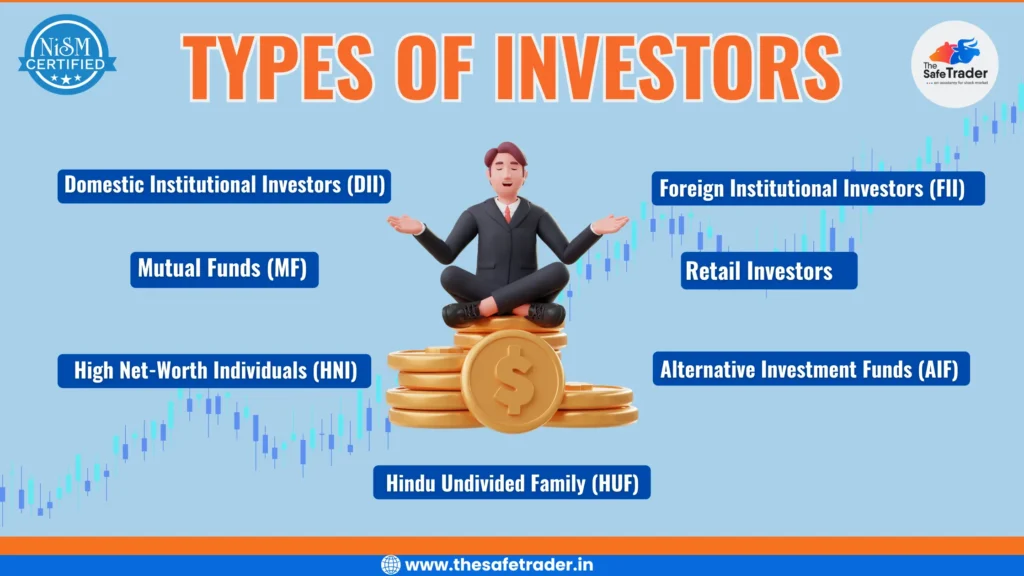Types of Investors in the Indian Stock Market

The Indian Stock Market is one of the largest and fastest-growing equity markets globally, driven by a mix of domestic and foreign investors. Each type of investor plays a distinct role in shaping market movements, liquidity, and sentiment. Let’s explore these types, their roles, and their impact – with real numbers and trends. Domestic Institutional Investors (DII) DIIs include mutual funds of India, insurance companies, pension funds, banks, and other big entities investing in domestic securities. Impact: In many cases, DIIs are the counterforce to FIIs. For example, when FIIs withdraw more than a lakh crore between 2022 and 2023 because of global uncertainty, DIIs gave support to the market with net inflows of nearly the same magnitude. Foreign Institutional Investors (FII) FIIs/FPIs are overseas funds investing in Indian equities, debt, and other securities. Impact: Generally, FIIs hold the status of suggestive influences of the market. Heavy inflows by them generate upward trends (take post-COVID), while their withdrawal creates volatility. High Net-Worth Individuals (HNI) HNIs are individuals with significant investable surplus, often above ₹2 crore, investing in stocks, bonds, PMS schemes, or AIFs. Impact: HNIs often take concentrated bets or participate in block deals. Their moves are closely watched by brokers and analysts. Retail Investors These are individual investors who invest small amounts compared to institutions and HNIs. They participate through direct stocks, mutual funds, or ETFs. Impact: Retail investors dominate trading volume in small-cap and mid-cap stocks and are quickly becoming a force within IPO subscription. Hindu Undivided Family (HUF) The Indian legal system allows the traditional family investment structure, treated as a separate entity for tax and investment purposes. HUFs have no separate public record for their holdings but form part of the retail/HNI investor set. They subconsciously get associated with long-term wealth-building opportunities like holding blue-chip stocks or mutual funds. Alternative Investment Funds (AIF) As the name indicates, they pool money from HNIs and institutional investors to invest in non-traditional assets such as private equity, venture capital, real estate, distressed debt, and hedge funds. Impact: AIFs take the Indian startup ecosystem, infrastructure, and other alternative sectors to more depth than what public markets offer. Mutual Funds (MF) Mutual funds pool savings from retail and HNI investors and invest in diversified portfolios of stocks, bonds, or hybrid assets. Impact: Mutual funds help channel domestic savings into the stock market and are key drivers of long-term stability and disciplined investing. Snapshot of Ownership (2024) Investor Type Market Share in NSE-Listed Cos (Approx.) FIIs / FPIs 18% – 20% DIIs 16% – 18% Mutual Funds Part of DIIs (AUM ₹52 lakh crore) Retail + HNI 7% – 8% Government ~6% (through direct holdings in PSUs) Conclusion The Indian stock market is a blend of domestic and global forces: As an investor, understanding these players helps you interpret market moves better and design smarter strategies!
